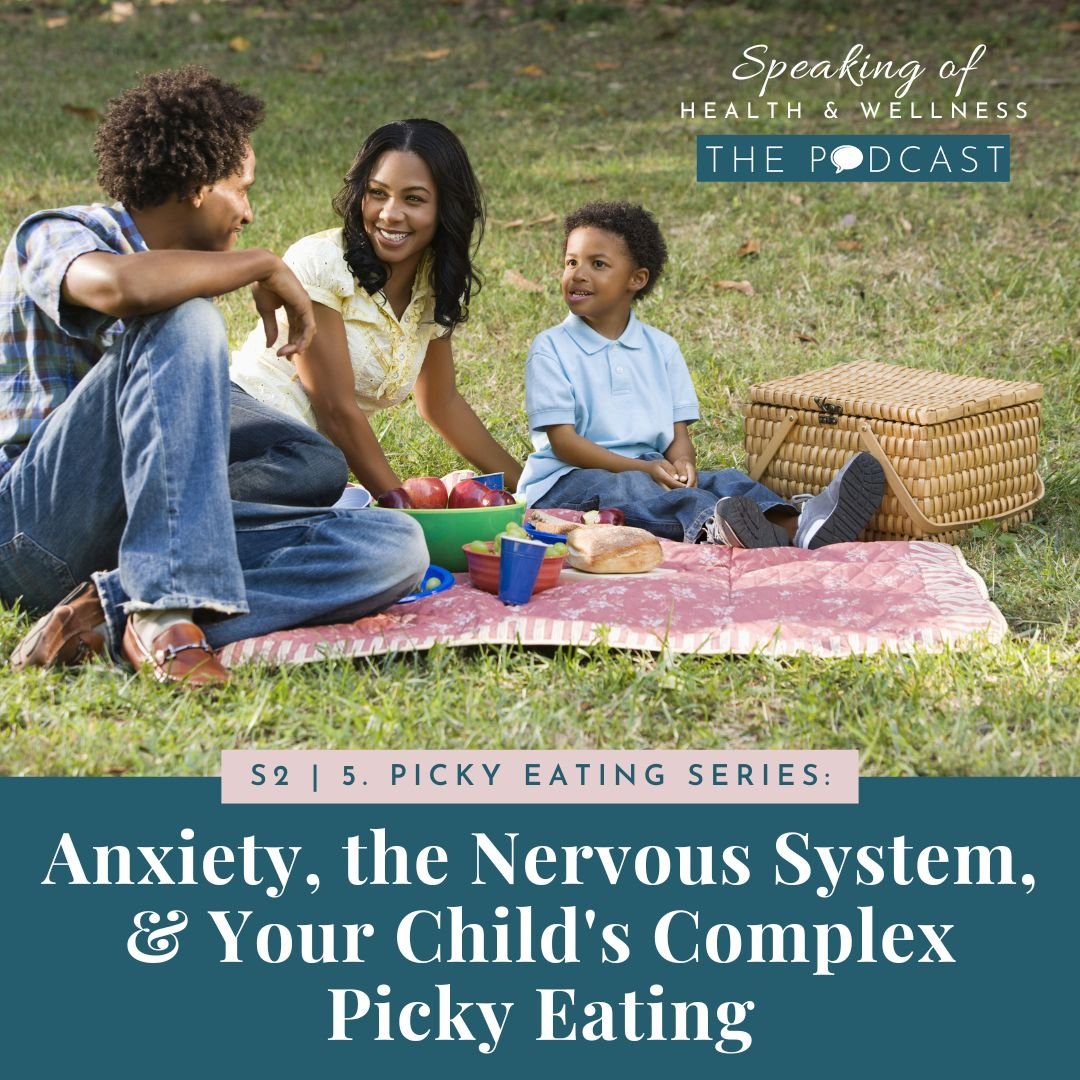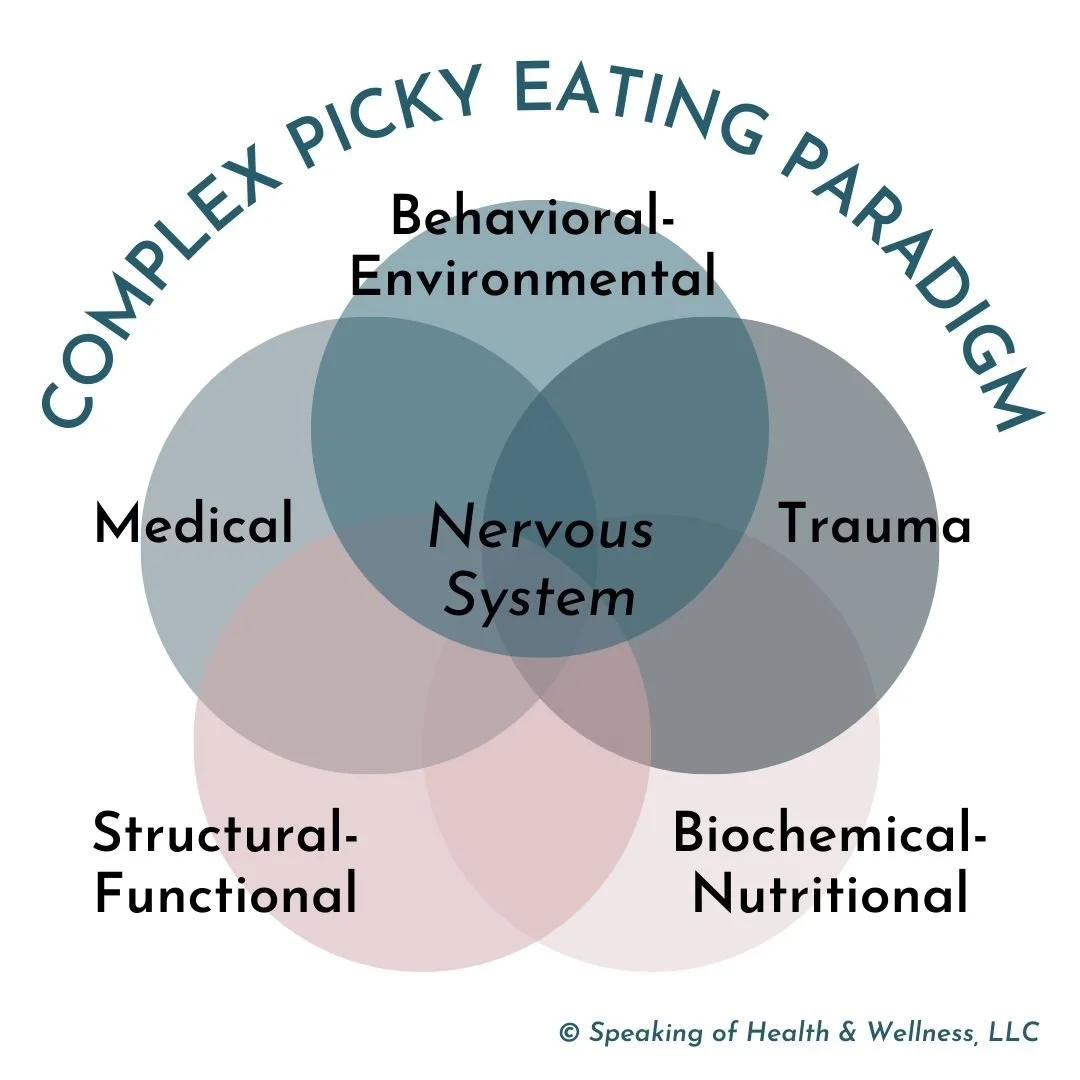Learn how the © Complex Picky Eating Paradigm (CPEP) has been updated to highlight the nervous system at the center. Understand why a holistic, nervous-system-informed approach helps children with complex picky eating.
What Is Heavy Work? Simple Ideas to Help Kids Feel Calm and Regulated
The Missing Piece in Picky Eating: Nervous System Regulation
Autism and Picky Eating: Looking Beneath the Surface
S2 | 5. PICKY EATING SERIES: Anxiety, the Nervous System, & Your Child's Complex Picky Eating
My new online course, Naturally Navigating Picky Eating, for parents of children with complex picky eating (with and without developmental conditions), is OPEN for enrollment!
On this fifth and final episode of the Picky Eating Series this week, during the launch of Naturally Navigating Picky Eating, I'm discussing the connections between anxiety, the nervous system, and your child's complex picky eating.
The episode starts with a very brief overview of the nervous system in layman's terms, how it relates to your child's anxiety generally speaking and more specifically with food + mealtimes.
Having a regulated nervous system helps children feel a sense of safety and well-being within their body and environment, which is so needed for proper digestion and absorption of nutrients. We want kids to be in a "rest and digest" state for mealtimes.
I’ll share how you can use external supports, like changing the environment or using diet + nutrition and lifestyle strategies to help support your child's nervous system regulation.
We also cover unique cases that can be related to children with complex picky eating, where pathogens are actually contributing to immune system dysregulation and there's a low-level inflammatory response, impacting the nervous system (in PANS/PANDAS conditions, specifically).
Listen in for a variety of ideas to support your child's nervous system regulation to help bring down their anxiety and improve their relationship with food and mealtimes... Starting with supporting your nervous system regulation during mealtimes.
You can listen directly below or on iTunes, Spotify, and other major podcast platforms.
If you want to keep learning and receive more guided support to help your child overcome complex picky eating, LEARN MORE & ENROLL in Naturally Navigating Picky Eating today!
S2 | 4. PICKY EATING SERIES: Is Your Child’s Picky Eating Driving You Crazy? The Importance of Staying Neutral...
My new online course, Naturally Navigating Picky Eating, for parents of children with complex picky eating (with and without developmental conditions), is OPEN for enrollment!
CLICK HERE TO LEARN MORE & ENROLL TODAY
Does your child's picky eating sometimes drive you a little...crazy? I hear this all the time! I know you know you're not alone, don't you? Let's talk about it!
Tying in the concepts from the previous episodes in this Picky Eating Series, I'm sharing the importance of staying neutral in the times when you're feeling the most annoyed, frustrated, and defeated when it comes to your child's picky eating.
Not only am I discussing why the importance of staying neutral during these times (you can likely already infer why it is), you'll also hear me share actionable strategies and tips that you can implement TODAY, at your family's next mealtime!
You can listen directly below or on iTunes, Spotify, and other major podcast platforms.
If you want to keep learning and receive more guided support on how to bring more ease and joy to your family's mealtimes, LEARN MORE & ENROLL in Naturally Navigating Picky Eating today!
S2 | 3. Picky Eating Series: How to "Meet Your Child Where They Are" During Mealtimes
In order to “meet your child where they are” during mealtimes, you need to understand where they are... I encourage you to do that by zooming out, becoming an observer, taking an inventory of your child's current accepted foods, look for patterns and start making a plan that gently encourages them to the next "step". Listen in for action-steps and practical examples of how to "meet your child where they are" during mealtimes!
S2 | 2. PICKY EATING SERIES: Instilling Confidence in Your Picky Eater
Does your child have a lot of food and/or mealtime anxiety that's involved with or contributing to their complex picky eating? Unfortunately, that's not uncommon for the children and families that I serve. You're not alone... and there's hope!
In this second episode of the Picky Eating Series, I'm sharing strategies to help you instill confidence in your child when it comes to food and mealtimes. Learn more about how you can decrease anxiety by building familiarity and instilling confidence in your picky eater - Listen in!
S2 | 1. PICKY EATING SERIES: Reframing the Goal of Mealtimes
The podcast is back! AND...
My new online course, Naturally Navigating Picky Eating, is LIVE and open for enrollment! CLICK HERE TO LEARN MORE & ENROLL TODAY!
Have you ever wanted to ask, "How do I get my child to eat [whatever food it is]?" -- It's a question I hear all the time!
Instead of asking how to get your child to eat [this or that new food], I'm encouraging you to zoom out and meet your child where he/she is!
In this episode, I'm offering a perspective shift for parents of children with complex picky eating, encouraging a reframing of the goal at mealtimes... Removing so much of that pressure that's placed on your child, on you, on the mealtimes in general.
The goal should always be: A long-standing healthy relationship with food, mealtimes, and their body... and you, as their parent and/or caregiver! Tune in to hear how to develop this with time, consistency, and patience.
You can listen directly below or on iTunes, Spotify, and other major podcast platforms.
Healthier Halloween Ideas Your Kids Will Love!
"Picky Eating": What's Developmentally Appropriate & How to Know When it's a More Complex Issue
Would you describe your child as a “picky eater”? Many parents of young children do!
How do you know when it’s developmentally appropriate vs. when is it a more complex issue to investigate and seek support? I’m here to help you understand this distinction and determine the answer for your child (and/or clients).
As an integrative Speech-Language Pathologist and pediatric feeding specialist, in addition to being a Functional Nutritional Therapy Practitioner and Documenting Hope Certified Health Coach, my passion is working with parents who are navigating complex picky eating and/or neurodevelopmental conditions (often overlapping but not always).
The term “picky eating” is so broad and often overused for kids who really do have a more complex issue, like a pediatric feeding disorder. Most pediatric and family health, wellness, and developmental providers are not properly trained to understand the full scope of “picky eating” (like knowing when it’s a real problem for families, how to help, and where to refer them based on the issue).
Let’s take a look at what’s considered developmentally appropriate vs. what would be considered a more complex issue…
Please note: The following lists of “picky eating” criteria were largely inspired by, and some contents were adapted directly from, S.O.S. Approach to Feeding, "Picky Eaters versus Problem Feeders", by Dr. Kay A. Toomey.
Developmentally Appropriate “Picky Eating”:
Child is within toddler to preschool age and…[see below]
Will eat at least 30 different foods
Eats at least one food from most food textures and/or nutrition groups
May really enjoy a certain food for a while then "burn out" on it, then re-introduce in a couple weeks
Is able to emotionally tolerate the sight of new foods on the table and on their plate most of the time
Will usually, sometimes hesitantly, touch or taste a new food
Typically eats with the family but not uncommon for them to sometimes have a different meal or different variations of the family meal
“Picky eating” seems to come and go (it’s not every single meal, every single day)
Sometimes reported as a "picky eater" to health providers
When I use the term complex picky eating, I’m referring to when a child's picky eating / self-restricted eating habits are not developmentally appropriate and are persistently & consistently causing quality of life issues for the child and/or family.
Some synonymous or sometimes co-occurring terms could also be: Pediatric Feeding Disorders, problem feeders, extreme picky eating, severe picky eating, etc.
Note: These terms listed above are not always exactly synonymous and/or co-occurring with what I’m describing as complex picky eating. Ex: There are some children who have Pediatric Feeding Disorders (PFD) who I would not consider complex picky eaters, but sometimes children with complex picky eating have a presence and/or history of a Pediatric Feeding Disorder.
Complex Picky Eating:
Child’s “picky eating” consistently creates a quality of life issue for the child and/or family (unpleasant mealtimes and feelings of stress, overwhelm, defeat, etc.)
If your child has a developmental delay(s), neurodevelopmental condition(s), or other special need(s) as well as the presence of “picky eating” that impacts your child and/or family’s quality of life
If your child has a diagnosed chronic health condition or the persistent unwanted chronic health symptoms as well as the presence of “picky eating” that impacts your child and/or family’s quality of life
Child is outside of those toddler to preschool age years and still has regular persistent “picky eating” tendencies
If in toddler to preschool years and...[see below]
Typically self-limited down to eating less than 20 different foods
May really love a food, eat it often and consistently, then seems to "burn out" on it
For these kids, foods that become "food jags" are generally not easily reintroduced once they’re lost or “burnt out” on them (at least not for a long, long, time)
Child has a very difficult time emotionally tolerating the sight of new and/or unpreferred foods on their plate
May whine, cry, protest, push away plate, take the new or unpreferred food off right away, etc. Full refusal of the new or unpreferred food(s)
Child's reaction to new or unpreferred foods causes an emotional disruption in the mealtime
Refuses certain food textures or nutritional groups entirely
Almost always eats a different meal than the rest of the family and often doesn't eat with the family during mealtimes (sometimes because the family’s food bothers the child)
Consistently reported as a "picky eater" to health providers
To help parents better understand how all of the pieces fit together, I created what I call the © Complex Picky Eating Paradigm. This is a Venn-style visual that represents just how interconnected and overlapping the multifactorial roots of complex picky eating are and includes something essential at its center: the nervous system. Every domain that contributes to complex picky eating, from behavioral-environmental, medical, trauma-related, structural-functional, and biochemical-nutritional, both influences and is influenced by a child’s nervous system.
Picky eating isn’t simply “behavioral,” “sensory,” or “nutritional.” For many children, it’s a whole-child experience where multiple systems overlap: their nervous system regulation, sensory processing, gut health, nutritional status, blood sugar regulation, where they’re at developmentally, and their lived experiences around food.
The © Complex Picky Eating Paradigm is designed to give you both a big-picture view and a compassionate way to understand your child’s unique combination of needs. When we look at a child through this lens, it becomes clear why traditional tips, pressure-based strategies, or “just one bite” approaches often backfire, they don’t address the underlying overlapping roots of the challenge or support the child’s sense of safety in their own body.
My hope is that this visual helps you feel more grounded, more empowered, and more confident in recognizing that your child’s eating is not just a phase or a behavior to fix. It’s a multifaceted pattern that deserves a multifaceted, respectful approach, honoring the simple truth that every child is their optimal self when they are their healthiest self.
Pediatric Feeding Disorder:
Pediatric Feeding Disorder is the official diagnostic term that some of the children with what I’m often referring to as complex picky eating could potentially qualify for. Typically I choose to use “complex picky eating” more often in my content because it’s more “parent friendly” / what parents are internet searching, at least initially.
It is estimated that 1 in 37 children in the United States under the age of 5 has a Pediatric Feeding Disorder.
According to Manikam & Perman (2000), “Pediatric feeding disorders are common: 25% of children are reported to present with some form of feeding disorder. This number increases to 80% in developmentally delayed children. Consequences of feeding disorders can be severe, including growth failure, susceptibility to chronic illness, and even death. Feeding disorders occur in children who are healthy, who have gastrointestinal disorders, and in those with special needs.”
Raising awareness and identification are the first steps!
I hope that this information helps clarify what is developmentally appropriate vs. what’s a more complex picky eating issue.
I encourage you to explore the contents of the site further and/or listen in to Speaking of Health & Wellness: The Podcast where I dive much deeper into this topic and give action steps that you can use at home! You can find the podcast here on the site and on major podcast platforms.
This podcast episode pairs well with this blog:
Are you ready to learn how to help your child overcome complex picky eating and bring more ease and joy to mealtimes?
Enroll today in Naturally Navigating Picky Eating, a self-paced online course + guide for parents and caregivers of children with complex picky eating, with and without developmental conditions…
Five Nutrients for a Healthy Brain & Which Foods to Find Them in
As the title shares, Episode 12 covers 5 nutrients for a healthy brain, not just for development and but also for general brain health! I share which foods to find these nutrients in and a variety of ways to incorporate these whole foods into your child's diet. I’m sharing insights and creative ways to improve your child's willingness to tolerate and try these new or even non-preferred foods. Hope you enjoy it!
Mentioned in the show:
Michelle Hoover from Unboundwellness.com - GFCF (AIP) Recipes - Salmon Cakes
Tony Mitra's work regarding organic chickpeas in North America containing glyphosate
Traumatic Brain Injuries, Leaky Brain-Leaky Gut, and Picky Eating...What's the Connection?
You may have heard of "leaky gut - leaky brain" but have you heard it the other way around? "Leaky brain- Leaky gut"?
In this episode, we're covering "leaky brain - leaky gut", primary and secondary brain injuries, a brief overview of the nervous system and the gut-brain connection, as well as the biochemical and neurobiological ways that complex picky eating can develop following a traumatic brain injury or even after a concussion that doesn't seem too significant or traumatic in nature.
We'll explore some beginning nutrition and lifestyle tips and strategies you may want to consider, regardless of how long it's been since the traumatic brain injury took place (although, the sooner the better of course). We'll cover how and why individuals with TBIs develop food and environmental sensitivities and what you can do to help support them, especially when it comes to complex picky eating.
If you're brand new to these topics of "gut health" and the gut brain connection, please visit Episode 6 titled, "How "Gut Health" Impacts Your Child's Health and Development" and then come back to this one. Episodes 6-10 are absolutely relevant to listen into if this resonates with you!
Do you know someone who could benefit from this information?
Please help spread this information to those who need it most by sharing this episode with them. Thank you so much for helping Speaking of Health & Wellness support more families and providers!
Enjoy the episode!















